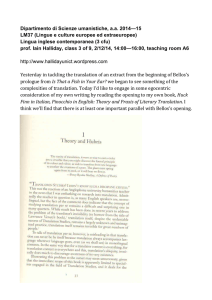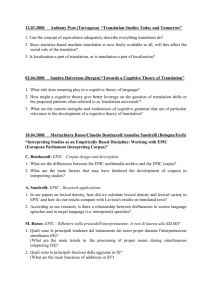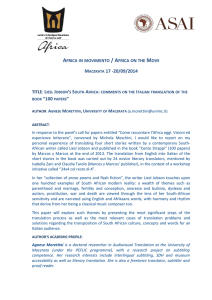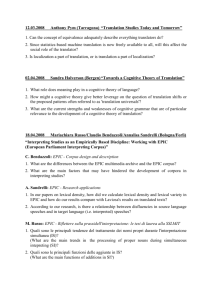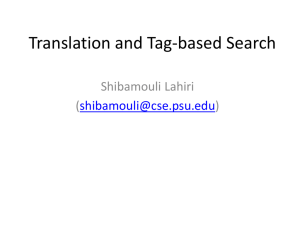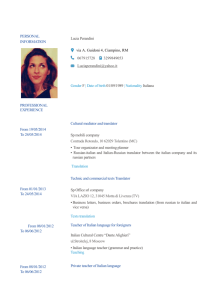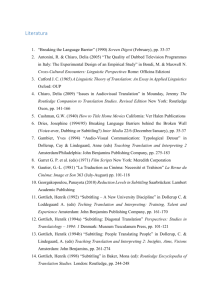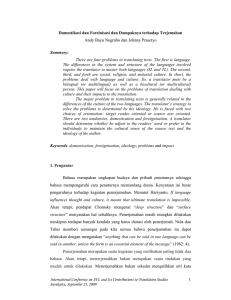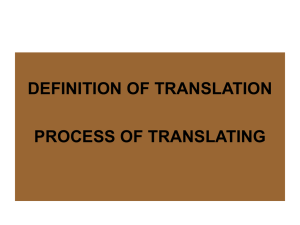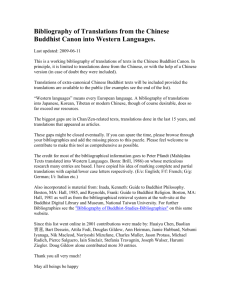Week 4 handout - University of Warwick
advertisement
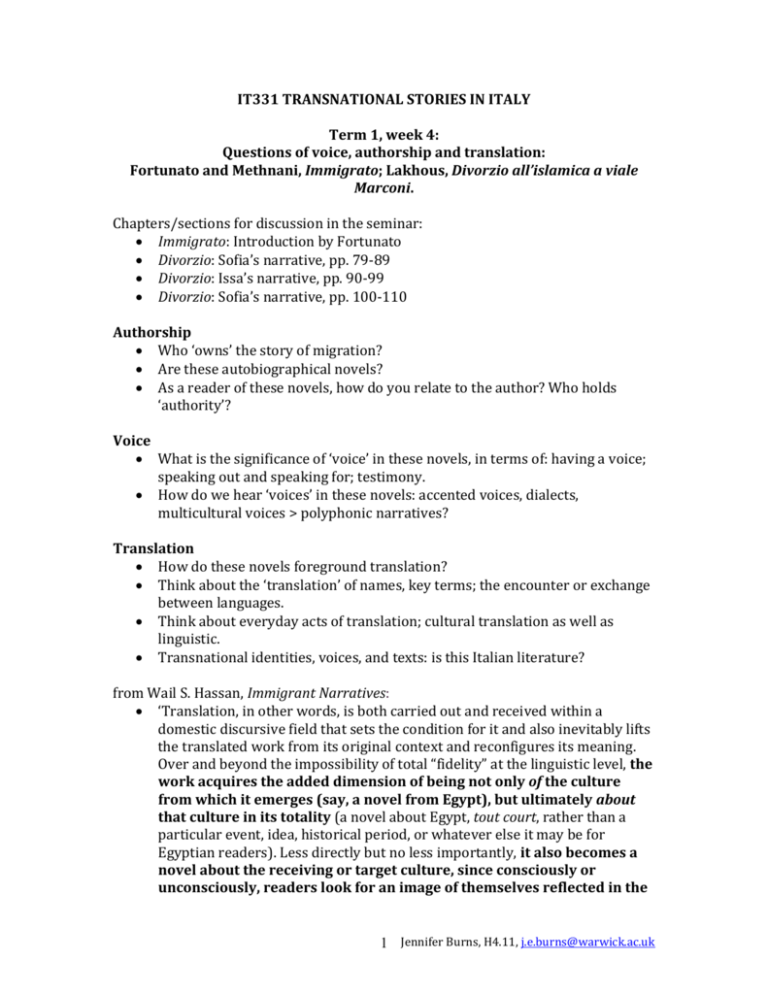
IT331 TRANSNATIONAL STORIES IN ITALY Term 1, week 4: Questions of voice, authorship and translation: Fortunato and Methnani, Immigrato; Lakhous, Divorzio all’islamica a viale Marconi. Chapters/sections for discussion in the seminar: Immigrato: Introduction by Fortunato Divorzio: Sofia’s narrative, pp. 79-89 Divorzio: Issa’s narrative, pp. 90-99 Divorzio: Sofia’s narrative, pp. 100-110 Authorship Who ‘owns’ the story of migration? Are these autobiographical novels? As a reader of these novels, how do you relate to the author? Who holds ‘authority’? Voice What is the significance of ‘voice’ in these novels, in terms of: having a voice; speaking out and speaking for; testimony. How do we hear ‘voices’ in these novels: accented voices, dialects, multicultural voices > polyphonic narratives? Translation How do these novels foreground translation? Think about the ‘translation’ of names, key terms; the encounter or exchange between languages. Think about everyday acts of translation; cultural translation as well as linguistic. Transnational identities, voices, and texts: is this Italian literature? from Wail S. Hassan, Immigrant Narratives: ‘Translation, in other words, is both carried out and received within a domestic discursive field that sets the condition for it and also inevitably lifts the translated work from its original context and reconfigures its meaning. Over and beyond the impossibility of total “fidelity” at the linguistic level, the work acquires the added dimension of being not only of the culture from which it emerges (say, a novel from Egypt), but ultimately about that culture in its totality (a novel about Egypt, tout court, rather than a particular event, idea, historical period, or whatever else it may be for Egyptian readers). Less directly but no less importantly, it also becomes a novel about the receiving or target culture, since consciously or unconsciously, readers look for an image of themselves reflected in the 1 Jennifer Burns, H4.11, j.e.burns@warwick.ac.uk mirror of a “foreign” novel. Moreover, such a novel also ultimately becomes about the relations between Egypt or Islam or Arabs or the “East” (however the work may be marketed to, and/or received by, the reader) on the one hand, and the U.S. or the “West” on the other hand (however that may be constructed by translator, publisher, reviewer, and reader). Such reconfiguration is inevitable in any literary translation, which is not only an aesthetic but also a cultural (or cross-cultural), discursive, and political activity’ (p.30). ‘translational literature’: ‘By that I do not mean all immigrant writing, but, strictly speaking, those texts that straddle two languages, at once foregrounding, performing, and problematizing the act of translation’ (p. 32). ‘Minor literature’ (Deleuze and Guattari) has three key characteristics: ‘in it everything takes on a collective value’ (p. 17); ‘in it language is affected with a high coefficient of deterritorialization’ (p. 16); ‘everything in [these novels] is political’ (p. 17). Select bibliography: Burns, Jennifer, ‘Borders Within the Text: Authorship, Collaboration and Mediation in Writing in Italian by Immigrants’, in Jennifer Burns and Loredana Polezzi, eds, Borderlines: Migrant Writing and Italian Identities (1870–2000) / Borderlines: Migrazioni e identità nel Novecento (Isernia: Iannone, 2003), pp. 387–94. ——, ‘Language and its Alternatives in Italophone Migrant Writing’, in Jacqueline Andall and Derek Duncan, eds, National Belongings: Hybridity in Italian Colonial and Postcolonial Cultures (Oxford: Peter Lang, 2010), pp. 127–47. ——, Migrant Imaginaries (Oxford: Peter Lang, 2013) *in particular, chapters 3 (‘Home’) and 4 (‘Place and Space’) Comberiati, Daniele, Scrivere nella lingua dell’altro: La letteratura degli immigrati in Italia (1989-2007) (Brussels: Peter Lang, 2010). Deleuze, Gilles, and Félix Guattari, Kafka: Toward a Minor Literature, trans. by Dana Polan (Minneapolis, MN: University of Minnesota Press, 1986). Hassan, Waïl S., Immigrant Narratives: Orientalism and Cultural Translation in Arab American and Arab British Literature (Oxford: Oxford University Press, 2011). Palladino, Mariangela, ‘Divorce and Dialogue: Intertextuality in Amara Lakhous' Divorzio all'islamica a viale Marconi’, Language and Intercultural Communication, 14.3 (2014), 287-303. 2 Jennifer Burns, H4.11, j.e.burns@warwick.ac.uk Pezzarossa, Fulvio, and Ilaria Rossini, Leggere il testo e il mondo: Vent’anni di scritture della migrazione in Italia (Bologna: CLUEB, 2011). Spackman, Barbara, ‘Italians DOC? Posing and Passing from Giovanni Finati to Amara Lakhous’, in Cristina Lombardi-Diop and Caterina Romeo (eds), Postcolonial Italy: Challenging National Homogeneity (New York: Palgrave Macmillan, 2012), pp. 125-38. Wilson, Rita, ‘Cultural Mediation Through Translingual Narrative’, Target: International Journal of Translation Studies, 23.2 (2011), 235-50. 3 Jennifer Burns, H4.11, j.e.burns@warwick.ac.uk
